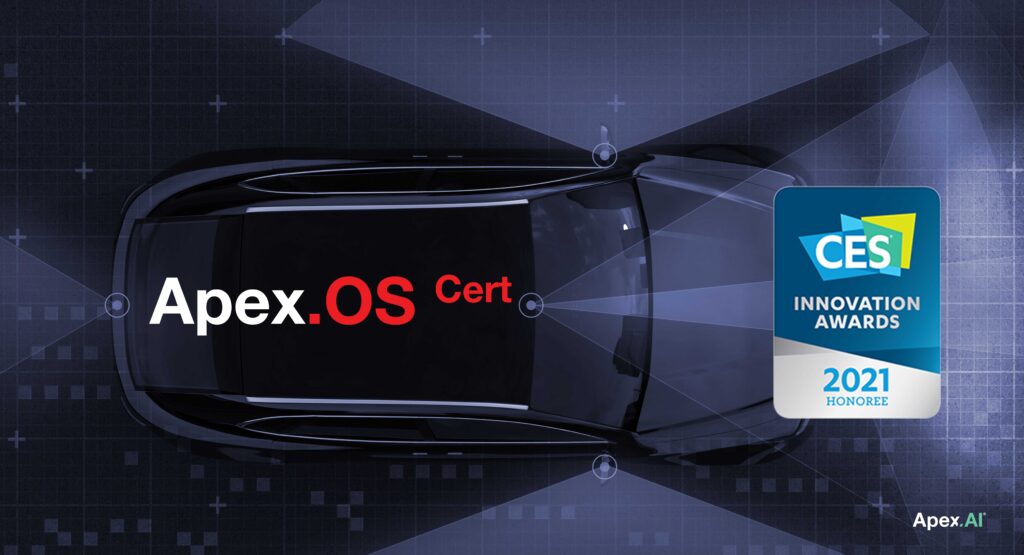Apex.AI has partnered with Toyota’s Woven Planet Group to help the Japanese car maker develop and deploy a production-ready autonomy stack for Arene, Toyota’s vehicle development platform to enable modern software development tools and best practices in the automotive industry.
Toyota’s Woven Planet is using Apex.OS, an easy-to-use software development kit (SDK) for automotive and other safety-critical applications, including autonomous driving software. Today’s vehicles are hardware-defined, and although they leverage existing advanced driver assistance systems (ADAS), they have dozens of components that are not integrated with each other. The industry’s transition to autonomous, connected, electric and shared vehicles requires software-defined vehicles with a much higher level of software integration – a challenge for traditional automotive players.
“Arene is our vision for the most programmable vehicle on the planet,” explained James Kuffner, CEO of the Woven Planet Group and a member of the board of directors at Toyota Motor Corporation. “Apex.OS embodies our vision of open APIs for developers to weave mobility and autonomy into our daily lives. It enables agile development and deployment for engineers, shortening the time from concept to deployment, and making rapid innovations in autonomous driving possible at the scale of Toyota.”
Arene is a vehicle development platform with state-of-the-art tools, vehicle application programming interface (APIs) and safety building blocks that allow rapid iteration to shorten the time from concept to deployment. Apex.OS is integrating into Arene’s software stack to reduce the R&D required by autonomous software development, enabling Toyota to create production-grade prototypes at a record pace.
“Toyota is a pioneer in autonomous mobility, and Apex.OS is accelerating innovation within the industry by providing a robust and reliable SDK that enables rapid, scalable and affordable autonomous system development,” said Jan Becker, co-founder and CEO, Apex.AI.
Apex.AI says it provides OEMs and Tier 1 suppliers with a single SDK (Apex.OS) that can address all the vehicle’s software needs, so that every component can work harmoniously to provide a powerful, scalable, affordable solution.
Much like a smartphone SDK, Apex.OS enables non-expert developers to create reliable and complex applications by leveraging APIs to abstract the complexity out of writing automotive software and into simpler interfaces. Apex.OS is based on the open-source Robot Operating System (ROS) and adds real-time processing, functional safety, flawless performance, and support for commercial and safety-critical products. Most automotive companies are using ROS today for R&D projects, but the software isn’t sophisticated enough for production vehicles.
Apex.OS bridges the gap between R&D and production-quality solutions by overcoming the real-time and reliability challenges. Switching to Apex.OS means an easy transition for engineers, without any of the issues of legacy systems. Apex.AI’s value proposition is that the company handles complex, tedious and safety-critical programming so developers can focus on the real-world problems they are trying to solve, like autonomous driving.
ISO 26262 certified by TÜV Nord
Apex.OS is also TÜV Nord certified for functional safety according to the highest level of ISO 26262, making the technology verified production vehicle ready. The certification is ASIL D safety level, which is an automotive risk classification that looks at the functional safety requirements for all the different electrical, electronic and software systems in a vehicle. It represents the highest level of risk management according to the most stringent safety requirements and aims for fewer than 10 failures in one billion hours of operation for hardware components.
“It was a longstanding belief that open-source code was not certifiable. However, our team achieved certification in record time so that it conforms to the highest requirements of the applicable automotive functional safety standard,” said Becker. “If a software crash happens on your laptop it’s inconvenient, but if software crashes in any safety-critical function of a vehicle it can be catastrophic. This is why we set out to write reliable software that protects against system crashes or operation failures. The certification proves we accomplished our goal as our software targets failure rates so low that they cannot be expressed statistically.”
Apex.AI has also announced a partnership with Tier IV, a deep tech startup in Japan known as the original creator of Autoware, the world’s first open-source software for autonomous driving. Examples of its application include the driverless robo-taxi program launched in Tokyo. The partnership aims to combine Tier IV’s Autoware-defined reference design and integration capabilities with Apex.AI’s software stack for safety-critical autonomous systems.
Working together, the companies hope to create a path to production by leveraging open-source components while capturing a wider range of safety requirements from the market through various offerings jointly developed by the partnership.
Apex.AI is based in Palo Alto, Berlin and Munich. Founded in 2017, it is backed by financial investors Lightspeed Venture Partners and Canaan Partners as well as strategic investors Toyota AI Ventures; Volvo Group; Jaguar Land Rover’s venture capital arm, InMotion Ventures; Airbus Ventures; Hella Ventures, and more.


